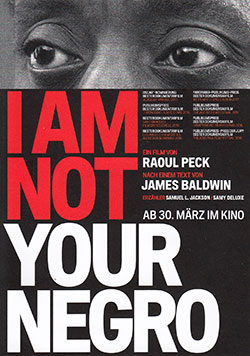I Am Not Your Negro

Gyanodaya reviews the 2016 American documentary film directed by Raoul Peck, based on James Baldwin’s unfinished manuscript, ‘Remember This House’.
Upon reading Madhuri’s well-written, positive review of the movie ‘Hidden Figures‘, I would like to respond in kind to a documentary by Raoul Peck, entitled ‘I Am Not Your Negro’. Narrated by Samuel L. Jackson, it has been given twelve awards for best documentary in 2016.
The film is about the author, playwright and poet James Baldwin, and his work exposing the life and times, and successive assassinations, of three great men: Medgar Evers, Malcolm X, and Martin Luther King. (Baldwin was a close family friend and associate of all three.)
This film is a meditative, eloquent and perceptive look at race relations in the US. It presents vast amounts of archival footage from the civil rights era, juxtaposed against modern-day representations of racial conflict in which both past and present are contextualized by the words of James Baldwin.
It depicts everything from blackface minstrels and Sidney Poitier film clips to Barack Obama and the Ferguson Riots. An unusually subdued Samuel L. Jackson, speaking barely above a whisper, narrates by reading passages from Baldwin’s unfinished memoir ‘Remember This House’.
The documentary proceeds to unveil the deep, fearful hatred and moral apathy wrapped up in a festering arrogance of evil racial superiority, uncovering the building blocks of genocide and slavery upon which that so-to-say (Great) nation has been spawned; thus is the white Americana’s lot. The main question being asked here is, why does the white guy need to invent the perverse concept of ownership over another – or for that matter over anything at all – and to name it Negro, my negro. What is it that he so lacks within himself that he acts from such a position of vain poverty and unashamed lazy impotence?
This is not an easy watch; there is little to cheer about in this expose except the power of its fiery, pertinent message; it is too important to be missed.
Every person, and especially school children should study this fine piece of documentary film (at least three times), so the message may (hopefully) sink in. Though those who need to see this film likely won’t, and will continue to keep their heads in the sand.
There is also some great music gracing our ears, throughout the movie, to which the African-Americans contributed massively, plus a clip from an early Newport Folk Festival, showing Dylan singing, ‘Only A Pawn In Their Game’, the song he wrote about the murder of Medgar Evers.
The interview of the director, by Marc Maron is pretty good, too. Out on DVD.
Review by Gyanodaya
- Log in to post comments
- 47 views
